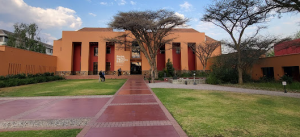The Essentials
Type of Institution: University
Fees per Year: R20 000.00 – R70 000.00
Address: Private Bag X1106, Sovenga, 0727, Polokwane, South Africa
Phone Number: +27 (0) 15 268 3332
Chancellor: Nkosazana Dlamini Zuma
Vice Chancellor: Mahlo Mokgalong
Number of students: 15 000+
Website: https://www.ul.ac.za/
Email: enrolment@ul.ac.za
Table Of Contents
- Overview
- Contact Details
- Address
- Location
- School Fees
- Courses & Programs
- Vacancies and Entry Requirements
- Logo
- Notable Alumni
- Pros and Cons
- Author’s Review
Overview
The University of Limpopo (UL) is a public university in South Africa located in the Limpopo province. Established in 2005, it resulted from a merger between the former University of the North and Medical University of Southern Africa (MEDUNSA). The university is committed to producing graduates who can contribute meaningfully to the socio-economic development of the region and the country.
Mission and Vision
The mission of UL is to be a leading African university focused on solving problems through innovative knowledge generation, teaching, and learning. The university’s vision is to empower the local community by producing graduates who are equipped with the knowledge and skills to address the challenges facing rural and underdeveloped areas.
Campuses and Location
Turfloop Campus: The main campus, situated in Polokwane, Limpopo. It is home to the majority of the university’s faculties and programs.
The MEDUNSA Campus (now part of Sefako Makgatho Health Sciences University) separated from UL in 2015, and it now exclusively focuses on health and medical sciences.
Research and Innovation
UL prioritizes research that addresses social, economic, and health challenges in South Africa. Key research areas include:
Rural development and agriculture: Exploring sustainable farming techniques and rural food security.
Health Sciences: Research on diseases such as HIV/AIDS, tuberculosis, and malaria, with a particular focus on rural healthcare solutions.
Environmental Studies: Research on water management, biodiversity, and climate change.
Community Engagement
Community engagement is a cornerstone of UL’s mission. The university works closely with local communities to offer health services, education, and development programs. Through its Rural Development and Innovation Hub, UL strives to improve living conditions in rural Limpopo by offering practical solutions to local challenges.
Student Population
The university serves more than 20,000 students, many of whom come from rural or disadvantaged backgrounds. UL provides a variety of support services to ensure student success, including academic support, career services, and financial aid options.
University of Limpopo Contact Details
You can contact University of Limpopo via their landline, email or you can visit their website for further contact details.
Phone Number: +27 (0) 15 268 3332
Website: https://www.ul.ac.za/
Email: enrolment@ul.ac.za
University of Limpopo Address
Private Bag X1106, Sovenga, 0727, Polokwane, South Africa
University of Limpopo Location
University of Limpopo has several campuses in the province but the main one is situated in Mankweng township in the city of Polokwane under the Limpopo province of South Africa on Cnr R71 Tzaneen Road & University Street.
University of Limpopo Fees
University of Limpopo’s fees is currently standing at R20 000.00 – R70 000.00 per year depending on the program you are studying and the level of degree you are studying. Please contact the institution or visit them to get the latest fees structure as it can change at any time.
University of Limpopo Courses & Programs
The University of Limpopo (UL) offers a wide range of undergraduate and postgraduate programs across its four faculties: Health Sciences, Humanities, Science and Agriculture, and Management and Law.
Faculty of Health Sciences
Undergraduate Programs
Bachelor of Medicine and Bachelor of Surgery (MBChB)
Bachelor of Nursing
Bachelor of Pharmacy
Bachelor of Optometry
Bachelor of Science in Medical Sciences (Anatomy/Physiology)
Bachelor of Science in Dietetics
Postgraduate Programs
Master of Public Health
Master of Medicine (various specialties)
Master of Science (in various health-related fields)
PhD in Health Sciences (various specializations)
Faculty of Humanities
Undergraduate Programs
Bachelor of Arts (BA) in:
English Studies
African Languages
Translation and Linguistics
Communication Studies
Sociology
Political Science
History
Anthropology
Bachelor of Social Work
Bachelor of Psychology
Bachelor of Education (BEd) in:
Foundation Phase Teaching
Intermediate Phase Teaching
Senior and FET Phase Teaching
Bachelor of Information Studies
Postgraduate Programs
Honours Degrees in various disciplines such as:
African Languages
Social Work
Psychology
Sociology
Political Science
Communication Studies
Master’s and PhD Programs in disciplines such as:
Social Work
Sociology
Psychology
African Languages
Political Science
Faculty of Science and Agriculture
Undergraduate Programs
Bachelor of Science (BSc) in:
Biological Sciences
Environmental and Resource Studies
Microbiology
Biochemistry
Computer Science
Information Technology
Chemistry
Physics
Mathematics and Statistics
Agriculture (Animal Production, Crop Science, Soil Science)
Bachelor of Agricultural Management
Bachelor of Environmental Science
Postgraduate Programs
Honours Degrees in:
Computer Science
Chemistry
Physics
Mathematics
Microbiology
Biochemistry
Environmental Science
Agricultural Sciences
Master’s and PhD Programs in:
Biological Sciences
Chemistry
Computer Science
Physics
Environmental Science
Agricultural Sciences
Faculty of Management and Law
Undergraduate Programs
Bachelor of Commerce (BCom) in:
Accounting
Business Management
Economics
Human Resource Management
Tourism Management
Bachelor of Administration (BAdmin)
Bachelor of Laws (LLB)
Postgraduate Programs
Postgraduate Diploma in:
Labour Law
Public Administration
Taxation
Honours Degrees in:
Accounting
Economics
Business Management
Public Administration
Master’s Degrees in:
Commerce (various fields)
Law (LLM in various specializations)
Public Administration
Development Studies
PhD Programs in:
Law
Commerce
Public Administration
Short Courses and Certifications
UL also offers several short courses and certifications across various faculties, such as:
Project Management
Human Resource Management
Public Administration
Taxation
Labor Law
University of Limpopo Vacancies and Entry Requirements
Entry Requirements
The entry requirements at UL differ based on the program and the level of study (undergraduate or postgraduate).
Undergraduate Admission Requirements
National Senior Certificate (NSC):
Applicants must hold a National Senior Certificate (NSC) or equivalent qualification with endorsement for degree studies.
For bachelor’s degree programs, applicants generally need to achieve a minimum Admission Points Score (APS) of 24-35 points, depending on the program.
A minimum of 50% in English (Language of Learning and Teaching).
Program-Specific Requirements:
Health Sciences (MBChB, Nursing, Pharmacy): Higher scores in Mathematics, Physical Sciences, and Life Sciences (minimum 60%-70% in each).
Science and Agriculture: Programs like BSc in Mathematics, Physics, and Agriculture typically require strong performance in Mathematics and Physical Sciences (minimum 50%-60%).
Humanities and Social Sciences: BA programs may have lower APS thresholds but still require proficiency in English.
Commerce and Law: Strong performance in Mathematics or Mathematical Literacy is needed for BCom and LLB programs.
Additional Requirements:
Some programs, especially in Health Sciences, may require applicants to take aptitude tests or undergo interviews.
For Education programs, subject requirements will depend on the specific teaching phase (e.g., Foundation, Intermediate, Senior, or FET).
Postgraduate Admission Requirements
Honours Programs:
A relevant bachelor’s degree with an average pass mark of 60% or higher in the final year of undergraduate study.
Some departments may require additional qualifications or experience.
Master’s Programs:
A relevant Honours degree or equivalent qualification.
A research proposal is typically required for research-based master’s programs.
Admission may also be subject to the approval of the departmental research committee.
Doctoral Programs:
A relevant Master’s degree.
Submission of a research proposal and proof of prior research experience.
Interviews may be required for some PhD programs.
International Students
International students must have qualifications equivalent to the South African NSC or relevant undergraduate qualifications for postgraduate studies.
Proof of English proficiency (such as TOEFL or IELTS) may be required if English was not the medium of instruction.
All foreign qualifications must be evaluated by the South African Qualifications Authority (SAQA).
International students must have a study visa for the duration of their studies at UL.
Application Process
Online Applications: Applications can be made online via the UL website. The application portal allows you to submit your application for undergraduate or postgraduate programs.
Required Documents:
Certified copies of your NSC or equivalent qualification.
Certified ID/passport copy.
Academic transcripts (for postgraduate applicants).
Proof of payment for the application fee (non-refundable).
Application Deadlines: UL typically has early closing dates for programs, especially for highly competitive programs like Medicine. Check the university’s website for specific deadlines.
For the latest information about vacancies and entry requirements, visit the University of Limpopo’s official website or contact the Admissions Office.
University of Limpopo Logo
Below is the logo of University of Limpopo with excellent quality and it is available to download in PNG (transparent file) JPEG and PDF.
University of Limpopo Logo
University of Limpopo Notable Alumni
Tito Mboweni – Foprmer Minister of Finance of South Africa
Lazarus Chakwera – Former President of Malawi
Busisiwe Mkhwebane – South African advocate and prosecutor
Frank Chikane – South African civil servant, writer and cleric.
Mathews Phosa – South African attorney, politician and anti-apartheid activist.
Kenneth Meshoe – South African evangelist, politician, reverend and teacher.
Stanley Mathabatha – Premier of Limpopo.
Dipuo Peters – Former Deputy Minister of Small Business Development of the Republic of South Africa
Lulama Xingwana – Former Minister for Women, Children and People with Disabilities
University of Limpopo Pros and Cons
Pros
Diverse Academic Programs: The University of Limpopo offers a wide range of programs across multiple faculties including humanities, science and agriculture, health sciences, law, and management and administration. This diversity caters to various academic and career interests.
Affordability: The university is known for its relatively affordable tuition fees, making higher education accessible to students from different socio-economic backgrounds.
Focus on Community Development: UL emphasizes community engagement and development through various initiatives and programs, providing students with opportunities to contribute to local and regional development.
Support Services: The university provides various support services such as academic advising, career counseling, student health services, and financial aid, which are crucial for student success and well-being.
Research Opportunities: UL has a growing focus on research and innovation, particularly in areas relevant to the region such as agriculture, health, and sustainable development. This provides opportunities for students and staff to engage in meaningful research activities.
Regional Presence: Located in the Limpopo province, UL serves a significant regional population and contributes to the educational development of an underserved area, which can be particularly appealing for students from the region.
Cultural and Diversity: The university promotes a culturally diverse environment, reflecting the multicultural nature of South Africa and enhancing the learning experience through exposure to different perspectives and backgrounds.
Student Engagement: UL offers various student activities and organizations, allowing students to engage in extracurricular activities, leadership development, and social responsibility projects.
Cons
Infrastructure Limitations: Some campuses may experience infrastructure challenges, including outdated facilities and limited resources, which can impact the quality of education and student experience.
Administrative Efficiency: There are reports of administrative delays and inefficiencies in processing applications, handling financial aid, and managing academic records, which can be frustrating for students.
Overcrowded Classrooms: Like many universities, UL may face overcrowded classrooms and large student-to-lecturer ratios, which can affect the quality of interaction and individual attention.
Limited Postgraduate Programs: The range and depth of postgraduate programs may be more limited compared to larger institutions, potentially restricting advanced study options for students.
Geographical and Accessibility Issues: The university’s location in a relatively rural area can pose accessibility challenges, especially for students from urban centers or other provinces. This can affect convenience and availability of services.
High Dropout Rate: UL faces challenges with a high dropout rate, which may be attributed to factors such as academic pressures, socio-economic issues, and inadequate support services.
Limited Industry Connections: There may be fewer strong industry connections and internship opportunities compared to institutions with more established networks, which can impact students’ job placement prospects.
Variable Quality of Facilities: The quality of facilities and resources can vary across different campuses, potentially leading to inconsistencies in the student experience and available amenities.
Author's Review
The University of Limpopo (UL) serves as a vital educational institution in South Africa, particularly for students from the Limpopo province and surrounding regions. With a diverse array of programs spanning humanities, science, health sciences, law, and management, UL offers valuable opportunities for students seeking affordable and accessible higher education.
However, the University of Limpopo faces several challenges, including infrastructure limitations, administrative inefficiencies, and high dropout rates. Issues such as overcrowded classrooms and variable facility quality can impact the quality of education and student satisfaction.
Additionally, the relatively limited range of postgraduate programs and potential accessibility challenges due to its geographic location may affect some students’ experiences and opportunities.
In summary, the University of Limpopo plays a crucial role in providing accessible education and fostering community development in its region.
While there are areas for improvement, particularly in terms of infrastructure and administrative processes, UL’s strengths in affordability, support services, and community engagement make it a significant and valuable institution for higher education in South Africa.



